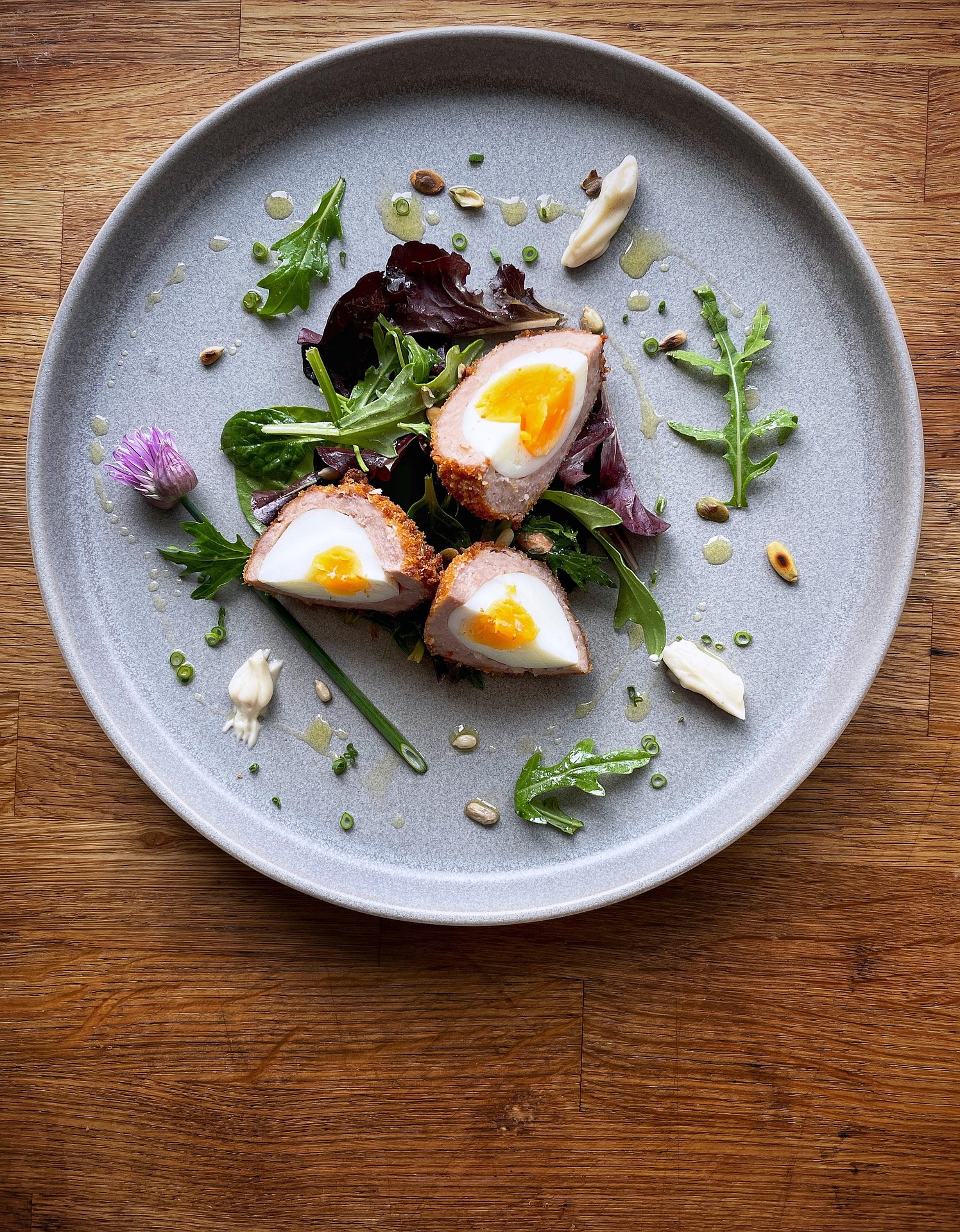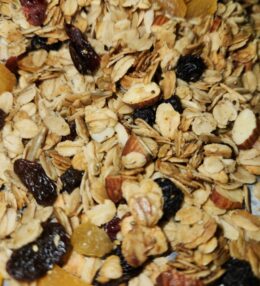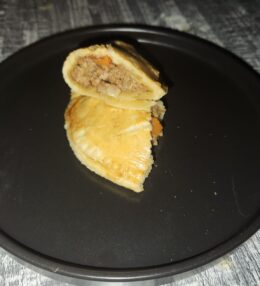
-
Prep Time35 Mins
-
Cook Time30-35 Mins
-
Serving4
Scotch eggs are a beloved British classic that combines the richness of a soft or hard-boiled egg with the savory goodness of sausage and a crispy breadcrumb coating. Whether enjoyed as a picnic staple, a pub favorite, or a homemade treat, they offer the perfect balance of textures and flavors. In this post, we’ll take you through a step-by-step guide to making the perfect Scotch eggs with foolproof tips for a crispy, golden-brown finish.
History of Scotch Eggs
The origins of Scotch eggs date back to the 18th century, with Fortnum & Mason, a famous London department store, claiming to have invented them in 1738 as a convenient snack for travelers. Some food historians suggest they were inspired by Indian nargisi kofta, a dish of spiced meatballs encasing boiled eggs. Regardless of their exact origin, Scotch eggs have since become a quintessential part of British cuisine, often found in pubs, delis, and home kitchens alike.
Ingredients
To make six perfect Scotch eggs, you will need:
- 6 large eggs, divided
- 1 cup (125 g) all-purpose flour
- 1 cup (50 g) panko breadcrumbs
- 450 g (about 1¼ cups) fresh breakfast sausage, casings removed (if necessary)
- Vegetable oil (for frying)
- Kosher salt and freshly ground pepper
- Optional: ½ teaspoon smoked paprika or cayenne pepper for added spice
- Optional: 1 tablespoon chopped fresh herbs (such as parsley, thyme, or chives) for extra flavor
Step-by-Step Instructions
Step 1: Boil the Eggs
- Bring a pot of water to a gentle boil.
- Carefully add 4 of the eggs to the water and cook for 6-7 minutes for soft-boiled or 10-12 minutes for hard-boiled.
- Once cooked, transfer the eggs to an ice bath to cool quickly, then peel and set aside.

Step 2: Prepare the Sausage Coating
- In a bowl, season the breakfast sausage with a pinch of salt and freshly ground pepper.
- Add optional seasonings like smoked paprika or fresh herbs for an enhanced flavor profile.
- Divide the sausage into 4 equal portions (about 112 g each).
- Flatten each portion into a thin disc, large enough to wrap around an egg completely.
Step 3: Encase the Eggs
- Gently wrap each boiled egg in a sausage portion, pressing to ensure full coverage without gaps.
- Roll the coated eggs between your hands to create a smooth, even layer.
Step 4: Breading the Scotch Eggs
- Set up a breading station with three shallow bowls:
- Bowl 1: All-purpose flour.
- Bowl 2: 2 beaten eggs.
- Bowl 3: Panko breadcrumbs.
- Roll each sausage-covered egg in flour, dip into the beaten eggs, and coat thoroughly with panko breadcrumbs.
- For an extra crispy crust, repeat the egg wash and breadcrumb coating once more.
Step 5: Frying to Perfection
- Heat vegetable oil in a deep pot or heavy-bottomed skillet to 175°C (350°F).
- Carefully lower the breaded Scotch eggs into the hot oil, frying in batches to avoid overcrowding.
- Fry for 5-7 minutes, turning occasionally, until golden brown and crispy.
- Transfer to a wire rack or paper towel-lined plate to drain excess oil.
Baking Alternative
If you prefer a healthier version, you can bake your Scotch eggs:
- Preheat your oven to 200°C (400°F).
- Place the breaded eggs on a baking sheet lined with parchment paper.
- Spray lightly with cooking oil to help with browning.
- Bake for 20-25 minutes, turning once halfway through, until golden and crispy.
Serving and Enjoying Your Scotch Eggs
Scotch eggs can be served warm or at room temperature. They pair wonderfully with:
- English mustard or grainy Dijon mustard for a tangy kick.
- A fresh green salad for a balanced meal.
- Pickles or chutneys for added depth of flavor.
- A side of fries or potato wedges for a hearty meal.
Tips for the Best Scotch Eggs
- For extra crispiness, double-coat with breadcrumbs.
- For a runnier yolk, reduce boiling time to 4-5 minutes before peeling.
- For a baked alternative, place the breaded eggs on a baking sheet and bake at 200°C (400°F) for 20-25 minutes.
- Use different types of sausage, such as spicy chorizo or herbed pork sausage, for unique flavor variations.
- For added texture, experiment with different coatings, like crushed cornflakes or seasoned breadcrumbs.
Storage and Reheating Tips
- Store leftover Scotch eggs in an airtight container in the refrigerator for up to 3 days.
- Reheat in an oven at 180°C (350°F) for 10 minutes to maintain crispiness.
- Avoid microwaving, as it can make the coating soggy.
Now that you have this foolproof recipe, it’s time to roll up your sleeves and enjoy making this delicious British delicacy. Whether you’re preparing them for a picnic, a snack, or a meal, these Scotch eggs will surely impress. Give them a try and let us know how they turn out! Happy cooking!
Ingredients
Scotch Eggs
Directions
Bring a pot of water to a gentle boil. Carefully add 4 of the eggs to the water and cook for 6-7 minutes for soft-boiled or 10-12 minutes for hard-boiled. Once cooked, transfer the eggs to an ice bath to cool quickly, then peel and set aside.
In a bowl, season the breakfast sausage with a pinch of salt and freshly ground pepper. Add optional seasonings like smoked paprika or fresh herbs for an enhanced flavor profile. Divide the sausage into 4 equal portions (about 112 g each). Flatten each portion into a thin disc, large enough to wrap around an egg completely.
Gently wrap each boiled egg in a sausage portion, pressing to ensure full coverage without gaps. Roll the coated eggs between your hands to create a smooth, even layer.
Set up a breading station with three shallow bowls: Bowl 1: All-purpose flour. Bowl 2: 2 beaten eggs. Bowl 3: Panko breadcrumbs. Roll each sausage-covered egg in flour, dip into the beaten eggs, and coat thoroughly with panko breadcrumbs. For an extra crispy crust, repeat the egg wash and breadcrumb coating once more.
Heat vegetable oil in a deep pot or heavy-bottomed skillet to 175°C (350°F). Carefully lower the breaded Scotch eggs into the hot oil, frying in batches to avoid overcrowding. Fry for 5-7 minutes, turning occasionally, until golden brown and crispy. Transfer to a wire rack or paper towel-lined plate to drain excess oil.
-
- Baked Scotch eggs alternative
- Best Scotch eggs recipe
- British pub food recipes
- Crispy Scotch eggs
- Deep-fried Scotch eggs
- Easy Scotch eggs recipe
- Homemade Scotch eggs
- How to make Scotch eggs
- Perfectly crispy Scotch eggs
- Picnic food ideas
- Scotch eggs recipe
- Scotch eggs step-by-step
- Traditional British Scotch eggs
-
You May Also Like



Leave a Review Cancel reply
The Ultimate Guide to Perfectly Crispy Scotch Eggs
Ingredients
Scotch Eggs
Follow The Directions

Bring a pot of water to a gentle boil. Carefully add 4 of the eggs to the water and cook for 6-7 minutes for soft-boiled or 10-12 minutes for hard-boiled. Once cooked, transfer the eggs to an ice bath to cool quickly, then peel and set aside.

In a bowl, season the breakfast sausage with a pinch of salt and freshly ground pepper. Add optional seasonings like smoked paprika or fresh herbs for an enhanced flavor profile. Divide the sausage into 4 equal portions (about 112 g each). Flatten each portion into a thin disc, large enough to wrap around an egg completely.

Gently wrap each boiled egg in a sausage portion, pressing to ensure full coverage without gaps. Roll the coated eggs between your hands to create a smooth, even layer.

Set up a breading station with three shallow bowls: Bowl 1: All-purpose flour. Bowl 2: 2 beaten eggs. Bowl 3: Panko breadcrumbs. Roll each sausage-covered egg in flour, dip into the beaten eggs, and coat thoroughly with panko breadcrumbs. For an extra crispy crust, repeat the egg wash and breadcrumb coating once more.

Heat vegetable oil in a deep pot or heavy-bottomed skillet to 175°C (350°F). Carefully lower the breaded Scotch eggs into the hot oil, frying in batches to avoid overcrowding. Fry for 5-7 minutes, turning occasionally, until golden brown and crispy. Transfer to a wire rack or paper towel-lined plate to drain excess oil.



Recipe Reviews